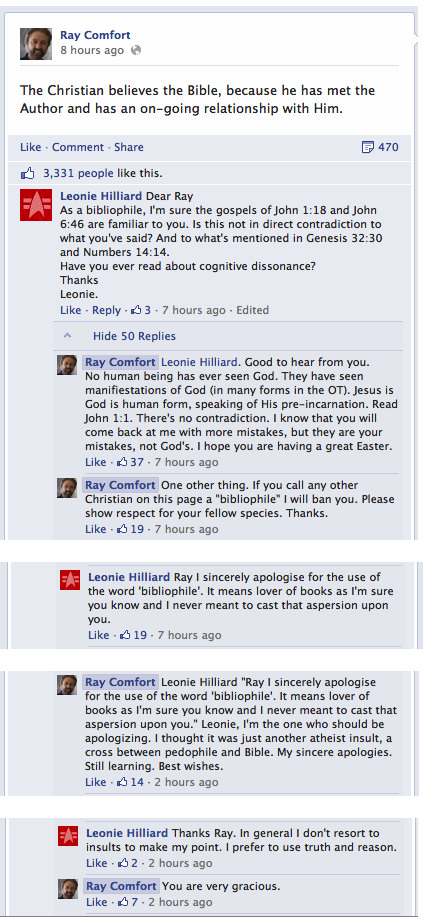Found this hanging around my drafts section. This was originally published on the official RationalWiki blog. It is reproduced here for, well, just for the sake of it. Minor stylistic changes added.
What is it?

Creationism most generally means the belief that the entire universe was created by a deity in a supernatural incident. Most commonly it refers to the Christian one but almost all religions in the world have some sort of creation myth that explains the origins of the universe. What we’re most interested in, however, is the branch known as “young earth creationism” (YEC). Not all creationists are YECs, and there are a few alternative forms, but 99% of the time skeptics will use “creationism” and YEC interchangeably – mostly because other forms are less interesting to skeptics and de-bunkers.
YEC specifically proposes that the world was created literally as described in the Bible, only 6,000 years ago according to the chronology deduced by Archbshop James Ussher in the 17th century – with the creation occurring October 23rd, 4004 BC, in fact. Yes, this is after some recorded written history and milestones such as the domestication of the dog.
It’s primarily a Christian doctrine (fundamentalist Islam, for instance, opposes evolution but doesn’t insist on a “young” Earth) and in its modern form is common to North America, where as much as 45% of the adult population believes it.
Erm… why?
Put simply, people believe this because it’s exactly what the Bible tells them. No one is quite sure why it persists as a belief, but it seems to be due to the fact that if you can challenge the literal Genesis creation story, you can accidentally invalidate the rest of the religion with it. Hence why attacks on young earth creationism, which is a falsifiable (and falsified) hypothesis, is continually conflated with an attack on religion, or an attack on Christianity in any and all forms.
(For instance, here, which is a protracted rant against YEC and anti-evolutionists that doesn’t at any point really talk about God or Christianity – but nevertheless is attacked in many comments as something to do with an anti-God atheist that hates Christians.)
It’s worth remembering at this point that in most of Europe and in other, non-literalist forms of Christianity, the idea of an old earth and of evolution is not assumed to be in conflict with the basic tenets of the religion. The Catholic Church, for instance, has “officially” accepted evolution since 1950 and human evolution since 1996 and makes no demands that Ussher’s chronology is correct. Back on the other side of the pond, organisations such as Ken Ham’s Answers in Genesis refer to such things as “compromise” – as in “compromised“, as if such acceptance of modern evolutionary theory and geology is somehow an infection in the purity of the true church.
What’s the evidence?
In the last 50 years or so, the Creationist movement in the US has branched out into “scientific creationism“. Skeptics often lambaste this as an oxymoron, but it does mean that they’ve been increasingly using “evidence” to support their claims. Here’s a brief run-down of a few of the common ones.
- The ordering of fossils is due to Noah’s flood. The animals found near the top of sedimentary strata escaped the rising waters, the “primitive” ones at the bottom did not.
- The Bible. Yes, this is actually used as evidence.
- The Grand Canyon is evidence of a drainage channel caused by Noah’s global flood.
This list is actually difficult to populate because the thing that is most common to YEC “evidence” isn’t evidence for a young earth, but usually a list of (mostly imagined) grievances against evolution and deep time geology. In fact, one of the approaches put forward by skeptics for dealing with creationists is to hypothetically grant them all their grievances and ask “so what positive evidence do you propose?”
This is particularly important because the evidence for the planet being formed billions of years ago is far more extensive than positive creationist evidence.
And the evidence against evolution?
A list of grievances against evolution is easier to generate. Some basic ones are listed here without refutation because they are mostly PRATTs (Points Refuted A Thousand Times) or Not Even Wrong.
- “Micro” evolution, which is small changes in varieties of animals, has been observed – while “macro” evolution, which is the change of animals into completely different ones, has not.
- Radiometric dating is flawed because it is calibrated circularly with fossils.
- There are no “transitional” fossils found between organisms.
- DNA contains complex information that “cannot” have evolved because evolution cannot increase information.
- Thermodynamic laws don’t allow life to become complex and ordered.
- Science can’t explain the origin of life – also known as “molecules to man” evolution.
- Science can’t prove that things evolved because it wasn’t there.
This is just a random sample of points, the lists often go into the hundreds.
Who are the main players?
The same names do crop up repeatedly in the YEC world, here is a brief list.
- Kent Hovind – founder of ‘Creation Science Evangelism’, got a ‘PhD’ from a diploma mill. Currently serving 10 years for tax fraud and evasion. (as an update on this, has recently as of 2014/15 been attempting to sue anyone who calls his crime “fraud” or “evasion”, even though it is. He’s attempted to sue RationalWiki over it, but can’t seem to get his act together enough to properly serve the papers to the RMF. Most people attribute this to him getting some spectacularly bad advice from someone in prison who is as mentally ill as he is.)
- Eric Hovind – the fairly charismatic but immature son of the above, now runs Kent’s ministries and hosts the “Creation Today” and “Creation Minute” webcasts.
- Ken Ham – current head of Answers in Genesis. Tends to evangelise to children in order to capture them young, most famous for his “were you there?” argument. (further update, you will know him from his debate with Bill Nye the Science Guy where both parties were famously asked “what would change your mind?” – Nye replied “evidence”, Ham replied “nothing”. There you go.)
- Ray Comfort – the infamous bananaman. Mostly concerned with (terrible) Christian apologetics but uses anti-evolution tropes to further this.
- Duane Gish – now deceased vice president of the Institute for Creation Research. Notable for having the Gish Gallop named after him.
- Jason Lisle – notable for having an actual legitimate PhD in astrophysics. Has a tendency to use very circular logic in his religious apologetics, and has attempted to solve the starlight problem.
- Jonathan Sarfati – like Lisle, has a legitimate PhD and knows it. Also known for being a bit of an obnoxious one.
William Dembski and Michael Behe are also names that repeatedly crop up, but these two are most commonly associated with Intelligent Design, rather than YEC. Which brings us to…
What about Intelligent Design?
Intelligent Design (ID) is an offshoot from creationism that, nominally, has nothing to do with it – technically, it is just an anti-evolution position, and therefore distinct from YEC beliefs as it does not mandate a young earth. However, it’s often associated with creationists and overlaps significantly (see cdesign proponentists and the Wedge Strategy), leading to the very justified accusation that it’s used to make creationism “respectable”, and tries to hide the “God” aspects in order to sneak it into schools in the US – where separation of Church and State is legally enshrined. ID is often called “creationism in a cheap suit” because of this.
And so what?
Creationism forms the bedrock of the anti-science movement in the US. It’s almost political suicide to speak against it, as such a thing is perceived as an attack on religion, which is absolutely sacred. As a result, it infiltrates a lot of the political sphere – which, importantly, controls funding for science programs. Creationism is also heavily associated with the Religious Right, and their attempts to get it taught in schools are readily associated with attempts to establish Biblical teachings in schools (along with their other depressing aspects including homophobia, misogyny and racism). In short, while it is a fundamentally silly and easily refuted, the way it’s played as a “freedom of religion” issue or as part of a persecution complex against Christianity, should be very worrying.








